Interview with Nicholas Dean author of ‘The Boy Who Saved Billy Bremner’.
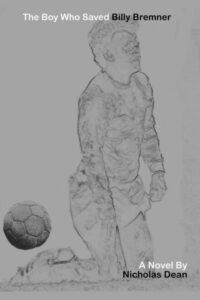 The Boy Who Saved Billy Bremner is the debut novel from Nicholas Dean. Ahead of FBR’s review of the book we caught up with the author to get the lowdown on this intriguingly titled book.
The Boy Who Saved Billy Bremner is the debut novel from Nicholas Dean. Ahead of FBR’s review of the book we caught up with the author to get the lowdown on this intriguingly titled book.
FBR: What was inspiration for book?
Nicholas Dean (ND): I guess, it came from my own upbringing. Obviously the streets and other locations in the book are both real and this extends to a number of the people such as some of the teachers and the owner of the newsagents. Also part of the inspiration and driving forces behind the book were my age and my children. As I have grown older, I have found myself reminiscing more about my childhood and where I grew up and as my children have asked about me growing up, the more the desire and need to capture those days and the people also grew. I have had the actual idea for the main storyline for a while but other plots seemed to develop and take on a life of their own, some of the characters too, such as ‘Snowy Vest’ for example.
FBR: Given that you had said the book has aspects of your childhood within the storylines, how much of the book is biographical?
ND: There are clearly certain biographical aspects and events within the book. Like they say, a writer writes about what they know about. The school friends and the group of kids on the estate are a mishmash of real people, including myself and some events such as the game in the French lesson and the snowball fight are based on real events, but the main narratives and majority of characters are fictitious
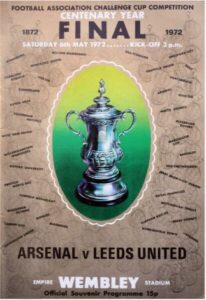 FBR: What is your first football memory and who do you support?
FBR: What is your first football memory and who do you support?
ND: As anyone might guess from the title of the book, I am a Leeds United supporter and how I became to support the team from Elland Road is rather similar to the central character Phillip Knott, in the book, only a few years later, around when the book is set. My family were from other areas of the UK – dad was from North East (Middlesbrough) and my mum from Herefordshire, so I did not have a direct connection to Coventry, although I was born there. My earliest football memories are the 1972 and 1973 FA Cup finals and of course Leeds United’s 29 game unbeaten run in the 1973-74 season. A run which I feel does not get the recognition it deserves. Another massive footballing memory from that period is watching the 1974 World Cup held in West Germany on the TV.
FBR: The Leeds and Scotland skipper Billy Bremner features not only in the title of the book but in its pages itself. Did you actually write to him, and if not how did the idea come about?
ND: The letter writing is all fictional. I remember the unbeaten run and the eventual loss at Stoke vividly for different reasons and had always had an idea to try and write about it in some way. How the eventual idea formed? To be honest, I am not sure. I guess, it was one of those eureka moments when I thought wouldn’t it be a good idea if I did this. Then I had to think about the issues Philip could be dealing with in order to write his letters.
FBR: How did you start writing?
I have always scribbled things here and there from a young age and the idea for and execution of my first novel was many years in the making and changed many times. I think when I was younger I had a fear of failure and a hang up around class. Working class people like me did not write books. I have always wanted to try it but lacked the confidence. Now, as I have already mentioned, age has played a part and pushed me to give it a try.
FBR: Stylistically, what writers influence you?
I don’t really think any particular writers influenced me or my writing style. I have to confess I do not read as much as I would like, my job and my family take up so much time and when I have time I tend to write rather than read. This is my second attempt at a novel; I haven’t done anything with the first one yet. I am currently reworking it.
FBR: Finally, how hard and what are the pitfalls for getting a book independently published?
I know the book lacks a professional touch and has a few errors but self-publishing was the only option left to me. I have become somewhat frustrated about agents and the way they operate. I have had many positive rejections, so to speak. Agencies seem to only want to take on guaranteed profit making books from the right type of person with the right profile. No matter how good my work might be, I don’t think I fit the required profile. I obviously make very little from the book on Amazon, 57p a sale to be exact but it is not about that. It is about people liking the book. I have had some great feedback and have sold over 300 copies which for me is great.
FBR: Nicholas, thank you for your time. Good luck with the book sales.
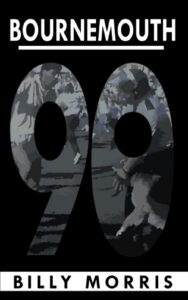 Back in November 2021 FBR reviewed
Back in November 2021 FBR reviewed 
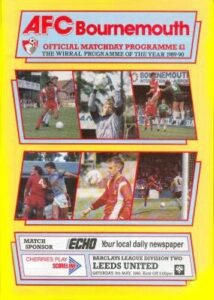
 BM: I always loved writing at school but leaving at sixteen with a couple of O-Levels, I knew I was never going to make a living at it. I did a variety of jobs over the next thirty five years in various places around the world, then as often happens when you reach your fifties, found I had more time to spend on things I enjoyed doing, rather than things I needed to do to make money. I read a lot of crime fiction, dark stuff like James Ellroy and David Peace, and I noticed on social media that there was a real nostalgia for the eighties and nineties era in Leeds. The city has changed so much since then that its almost unrecognisable. I started to think about an Ellroy/Peace style novel set at that time in the city that I remembered back then. That’s how Bournemouth 90 came about, and I was pleasantly surprised by how well received it was. A few people asked about a sequel, and I felt there were still a few unresolved questions, which are addressed in LS92.
BM: I always loved writing at school but leaving at sixteen with a couple of O-Levels, I knew I was never going to make a living at it. I did a variety of jobs over the next thirty five years in various places around the world, then as often happens when you reach your fifties, found I had more time to spend on things I enjoyed doing, rather than things I needed to do to make money. I read a lot of crime fiction, dark stuff like James Ellroy and David Peace, and I noticed on social media that there was a real nostalgia for the eighties and nineties era in Leeds. The city has changed so much since then that its almost unrecognisable. I started to think about an Ellroy/Peace style novel set at that time in the city that I remembered back then. That’s how Bournemouth 90 came about, and I was pleasantly surprised by how well received it was. A few people asked about a sequel, and I felt there were still a few unresolved questions, which are addressed in LS92.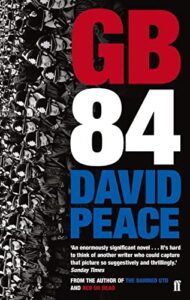 BM: As I said, I enjoy James Ellroy’s noir-style crime writing which is set in L.A. My biggest influence though is probably David Peace. Specifically the Red Riding Quartet, which transplant Ellroy’s dark style into 70s West Yorkshire. I remember reading 1974 for the first time and being totally blown away by the writing style. I enjoyed his later stuff, Damned Utd obviously and also GB84, though I’ve struggled to get into his recent Tokyo trilogy. I’ve tried to capture the feel of late eighties/early nineties in my books – a city struggling with its identity, more Merrion Market than Harvey Nicks and with LUFC struggling to shift the 80s hooligan reputation but knowing that a re-brand was vital to its future in the new millennium. To anyone who wasn’t around then, the place I describe probably feels like a different city altogether, and if that’s the case, I’ve achieved what I set out to do!
BM: As I said, I enjoy James Ellroy’s noir-style crime writing which is set in L.A. My biggest influence though is probably David Peace. Specifically the Red Riding Quartet, which transplant Ellroy’s dark style into 70s West Yorkshire. I remember reading 1974 for the first time and being totally blown away by the writing style. I enjoyed his later stuff, Damned Utd obviously and also GB84, though I’ve struggled to get into his recent Tokyo trilogy. I’ve tried to capture the feel of late eighties/early nineties in my books – a city struggling with its identity, more Merrion Market than Harvey Nicks and with LUFC struggling to shift the 80s hooligan reputation but knowing that a re-brand was vital to its future in the new millennium. To anyone who wasn’t around then, the place I describe probably feels like a different city altogether, and if that’s the case, I’ve achieved what I set out to do!